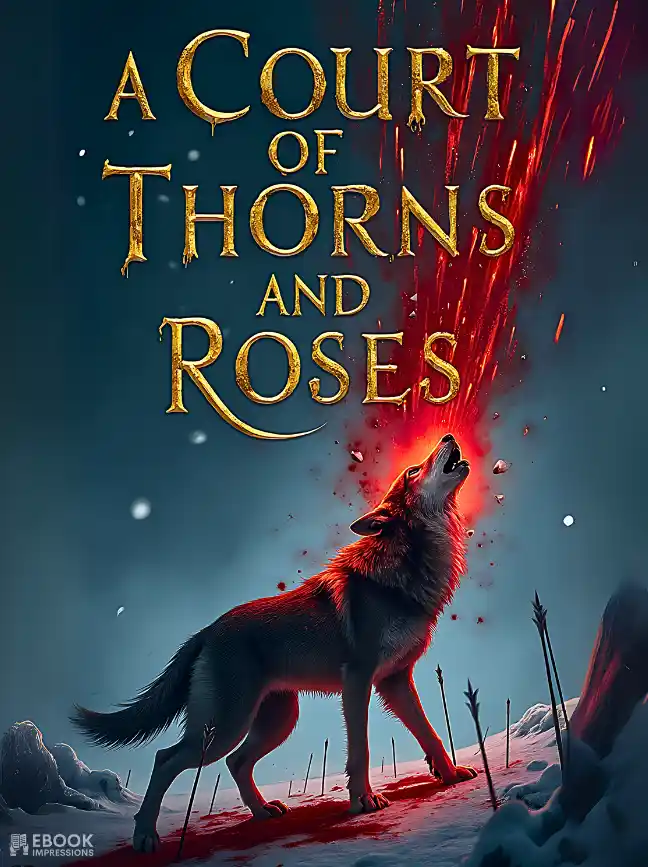Chapter no 3
On a bitter winter morning, Feyre trudged through her village with her sisters, Elain and Nesta, trailing close behind, eyeing the pelts she planned to sell at the market. The road, muddy and speckled with grime, reflected their bleak existence, while the market square provided a rare sense of vitality. As they approached, however, the sight of the Children of the Blessed—a group of zealous acolytes worshiping the High Fae—caused tension. Nesta’s sharp words and iron bracelet quickly sent the acolytes retreating, highlighting the villagers’ collective disdain for anything associated with the faeries, who had once ruled over them with cruelty.
At the market, Feyre weighed her options and chose to approach a mercenary to sell her pelts. The mercenary, a towering woman with scars and weapons that told of hard-earned survival, offered Feyre a surprisingly generous price. Despite Feyre’s initial hesitation, the mercenary revealed that she had once received similar kindness in her own time of need and felt it was time to repay that debt. She warned Feyre to stay away from the woods, mentioning the increasing danger of faeries and terrifying creatures like the martax crossing into mortal lands. The chilling description of these beasts and the mercenary’s own scars left Feyre unsettled, deepening her wariness of the looming threats.
After the exchange, Feyre reunited with her sisters, who immediately eyed the money she had earned. Nesta and Elain revealed their own harrowing encounter with a different mercenary who had once threatened them, reinforcing Nesta’s protective instinct. Feyre, though frustrated by their dependence, handed over some of her earnings, allowing them to buy essentials and perhaps a small comfort for their father. The sisters’ complex dynamic remained fraught with tension, resentment, and fleeting moments of unity, especially as Nesta showed an uncharacteristic willingness to contribute by chopping wood.
Later that evening, the family shared a meager dinner of venison, their temporary peace broken only by Feyre’s internal frustration over her sisters’ choices and their obsession with petty distractions like Tomas Mandray. Feyre contemplated broaching the subject of Nesta’s potential marriage but refrained as the quiet hour around the fire unfolded. The flickering warmth of the hearth seemed to mask the underlying fractures in their relationships, though Feyre’s sense of responsibility and sacrifice kept her bound to them.
The fragile calm shattered when a monstrous roar erupted, shaking the cottage and filling the air with snow as a massive, growling shape appeared in the doorway. The sudden, terrifying intrusion cut through the night’s fragile peace, bringing with it an ominous sense of danger and signaling that the threats Feyre had been warned about were no longer confined to the woods or the stories of mercenaries.
Chapter no 4
The moment the monstrous, wolfish beast appeared in the doorway, Feyre’s instincts kicked in, her hunting knife inexplicably in hand. With golden fur, elk-like horns, and a feline body, the creature was enormous and deadly, his rage unmistakable as he roared the word “Murderers!” at the terrified family. Feyre placed herself between the beast and her sisters, knowing that fear could not control her actions if she wanted to protect them. Despite the shaking of her hands, she stood her ground, ready to fight even as she realized that this was no ordinary beast—it was a faerie, and no amount of the family’s meager defenses could hold it back.
The beast demanded to know who had killed the wolf—his friend—revealing that the wolf Feyre had slain in the woods was not an ordinary animal but one of his kind. Feyre admitted to the act, refusing to lie despite her family’s protests. She boldly argued that the faeries had long tormented mortals, and the wolf’s death had been justified. Her defiance, however, did little to sway the faerie, who invoked the ancient Treaty between humans and faeries, stating that the only acceptable payment for killing one of his kind was a human life. The creature offered Feyre a grim choice: to die that night or to cross the wall into Prythian and live out the rest of her life in his realm.
With no chance of escape and the safety of her family at stake, Feyre reluctantly agreed to the faerie’s terms. The beast revealed that she would live on his lands, sparing her from the lethal wilderness of Prythian. Despite his declaration, Feyre knew that this decision might doom her to a life of terror and servitude, but her priority remained protecting her sisters and father. The faerie’s raw power and unyielding fury made it clear that any attempt to resist or flee would not only fail but also risk the lives of her family.
Before leaving, Feyre gave her father and sisters instructions to survive in her absence—how to ration the venison, hunt in the coming spring, and manage the money she had earned from selling the pelts. She warned Nesta not to marry Tomas Mandray, revealing the abusive nature of his household. Her sisters remained silent, stunned by the unfolding events, while her father, unexpectedly lucid, urged her to leave and never return. He declared that she was too good for their miserable life and deserved to find a better future, even if it meant breaking away from them forever.
With a heavy heart, Feyre followed the beast into the night, leaving behind the life she had fought so hard to sustain. Her father’s words echoed in her mind, mingling with the crunch of snow underfoot as she ventured toward the unknown dangers of Prythian. Though terrified of what lay ahead, Feyre resolved to survive, knowing that her sacrifice had spared her family, at least for now. As she disappeared into the shadowy woods, she steeled herself for whatever awaited her in the faerie realm.



